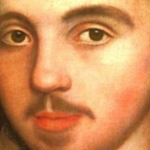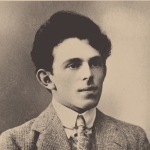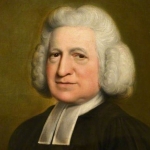My god, I heard this day
That none doth build a stately habitation
But he that means to dwell therein.
What house more stately hath there been,
Or can be, than is man, to whose creation
All things are in decay?
For man is ev'ry thing,
And more: he is a tree, yet bears more fruit;
A beast, yet is, or should be, more;
Reason and speech we only bring;
Parrots may thank us if they are not mute,
They go upon the score.
Man is all symmetry,
Full of proportions, one limb to another,
And all to all the world besides;
Each part may call the furthest brother,
For head with foot hath private amity,
And both with moons and tides.
Nothing hath got so far
But man hath caught and kept it as his prey;
His eyes dismount the highest star;
He is in little all the sphere;
Herbs gladly cure our flesh, because that they
Find their acquaintance there.
For us the winds do blow,
The earth doth rest, heav'n move, and fountains flow.
Nothing we see but means our good,
As our delight, or as our treasure;
The whole is either our cupboard of food,
Or cabinet of pleasure.
The stars have us to bed;
Night draws the curtain, which the sun withdraws;
music and light attend our head;
All things unto our flesh are kind
In their descent and being; to our mind
In their ascent and cause.
Each thing is full of duty;
Waters united are our navigation;
Distinguished, our habitation;
Below, our drink; above, our meat;
Both are our cleanliness. Hath one such beauty?
Then how are all things neat!
More servants wait on man
Than he'll take notice of; in ev'ry path
He treads down that which doth befriend him,
When sickness makes him pale and wan.
Oh mighty love! Man is one world, and hath
Another to attend him.
Since then, my God, thou hast
So brave a palace built, O dwell in it,
That it may dwell with thee at last!
Till then, afford us so much wit,
That, as the world serves us, we may serve thee,
And both thy servants be.



















Comment form: